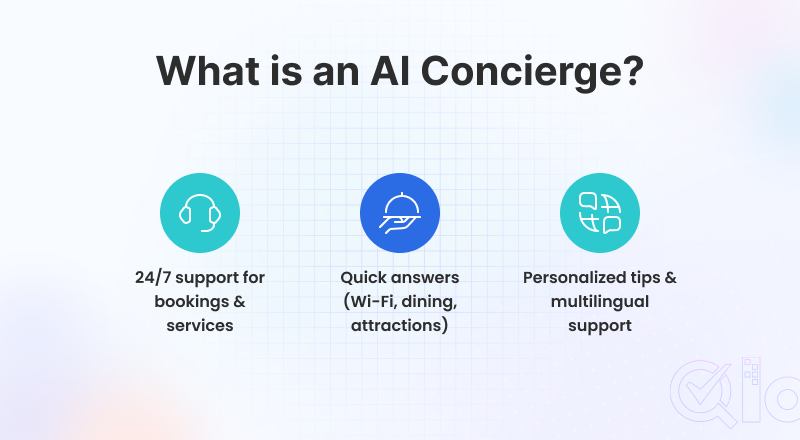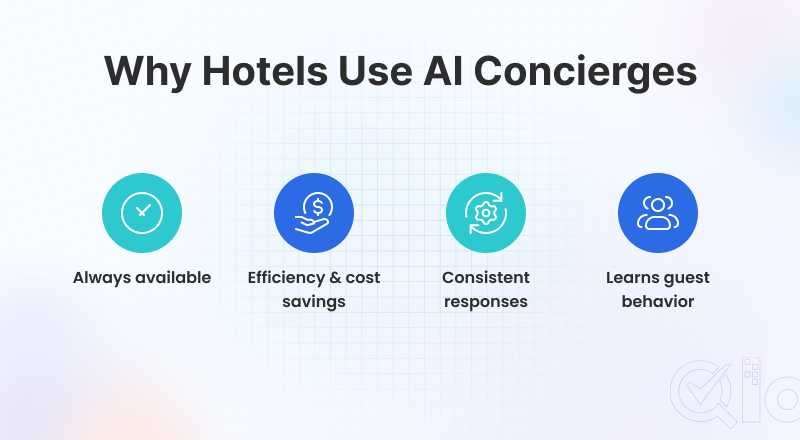The hospitality industry has always relied heavily on one important thing — guest personalisation and care towards the guest.
However, with the rise of artificial intelligence (AI), a new type of service has emerged — the AI concierge.
From the friendly greeting at check-in to small, thoughtful acts during a stay, the human touch has been the key to good hotels.
Hotels around the world are exploring how AI can help streamline operations. It is one of the many service innovations in the hotel industry.
Still, there’s a challenge — how can hotels use AI concierges while still keeping the warm, personal service that makes hotels great?
What is an AI Concierge?
An AI concierge is a virtual assistant that uses AI technology. It uses tools like chatbots, natural language processing (NLP), and machine learning.

Guests can talk to it through hotel apps, websites, kiosks, or even speakers in their rooms.
Why Hotels Are Using AI Concierges
AI concierges are always available. Unlike people, they don’t need breaks. Guests can get help anytime, any day.
They help make things more efficient and save money by handling simple tasks automatically.
This allows staff to focus on more important work.
AI also provides consistent support, giving every guest the same accurate and timely answers, which helps avoid mistakes humans might make.

AI can also learn from guest behavior. This helps hotels personalize marketing, offer better services, and improve loyalty programs.
For example, Hilton has a concierge called “Connie,” powered by IBM Watson.
It helps guests with local info and hotel services.
Marriott and other hotel chains are also experimenting with AI chatbots to make guest interactions easier.
The Human Touch: Still Important in Hospitality
Even though AI offers speed and efficiency, hospitality is mostly about human connection.
A warm welcome at check-in, understanding when a guest is upset, or simply being remembered by name — these experiences are hard for machines to create.
Human services have strengths like:
– Empathy — staff can understand and respond to emotions.
– Personal touches — like a handwritten note or a surprise upgrade that feels sincere.
– Creative problem-solving — dealing with unique guest requests that go beyond standard responses.
– Building trust — human interaction helps guests feel valued and comfortable.
Without the human element, hotels might feel cold or mechanical, which can make guests less satisfied.
Striking the Right Balance
The future isn’t about using AI to replace people, but about using it to work with people.
Here’s how hotels can find the right balance:
1. Use AI for Routine Tasks, and Humans for Emotional Support
AI can handle things like booking confirmations, directions, or common questions.
Human staff can focus on guest relations, sorting out problems, and creating special memories.
2. Mix AI with Personalization
Hotels should combine AI with customer relationship management (CRM) systems so that staff have guest preferences ready when they interact with guests.
This helps build personal connections during interactions.
3. Offer a Hybrid Check-In Experience
AI kiosks or apps can help guests check in quickly. Traditional counters are still available for those who prefer personal help.
4. Give Staff AI Tools to Help
Instead of replacing staff, AI should be a helper. For example, AI can analyze guest data, giving staff more time to connect with guests personally.
5. Be Open About Who You Are Talking To
Guests should know whether they’re talking to AI or a person. This prevents confusion and builds trust.
Benefits of a Balanced Approach
Hotels that use both AI and human service have a lot of advantages:
– Higher guest satisfaction — fast answers from AI and the kindness of staff.
– Better efficiency — staff have less work, but service quality stays high.
– Cost savings — AI handles simple tasks, while humans focus on important services.
– A competitive edge — hotels look modern and smart, but still friendly and guest-focused.
Looking Forward: AI in the Hospitality Industry
The hotel industry is moving toward a “phygital” world — mixing physical and digital experiences.
Guests now want both: the convenience of smart technology and the warmth of personal service.
AI concierges will become smarter.
Features like voice commands, suggested options, and Internet of Things (IoT) devices will make the service even better.
But human connection will always be at the heart of hospitality.
The best hotels of the future won’t be the ones that go fully digital. They’ll be the ones that use AI to help staff, not replace them.
Technology will handle the tasks. Humans will make the stay special.
Final Thoughts
The debate between AI and human service isn’t about choosing one or the other.
It’s about working together. AI takes care of quick tasks and routine help, while humans focus on warmth and care.
For hotels, the goal is simple:
Let AI handle what it’s good at — fast answers and automation.
Let people handle what they’re good at — connecting and caring.
When technology and people work together, hotels can offer guests the best of both — efficiency and hospitality.
That balance will shape the future of great guest experiences.
Get in Touch
Whether you’re coordinating local events or just wanting to raise your hotel’s local event vibe,
QloApps believes in you and will support you every step of the way. We will streamline everything from bookings to operations so that you have to focus on guest experiences.
Haven’t tried QloApps yet? Check it out! It’s a free download.
Need help getting started? Our team is just a message away and always happy to help.

Be the first to comment.